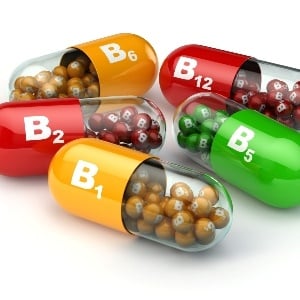
Women who eat a diet rich in B vitamins have less risk of premenstrual syndrome (PMS), researchers say.
Women who ate more foods such as spinach and fortified cereal had about a 25% lower risk of PMS, according to the study published online in the American Journal of Clinical Nutrition.
The same was not true, however, for women who got their B vitamins from supplements.
The study does not prove that B vitamins, like thiamine and riboflavin, stave off PMS. It's possible, for example, that women who eat more of these vitamins also have other habits or characteristics that have an effect.
Still, women with PMS "might want to evaluate their diet and make sure they're having a reasonable (amount) a day of thiamine- and riboflavin-rich foods," said Elizabeth Bertone-Johnson, associate professor of public health at the University of Massachusetts, Amherst.
Severe PMS
Severe PMS, which affects about one in six women, is sometimes treated with either birth control pills or antidepressants, said Bertone-Johnson, who co-authored the study.
Reducing the chance of PMS through diet may be an alternative to some of these treatments, which are expensive and can have side effects, she said.
The researchers looked at the diets of more than 3000 women who filled out food surveys three times over 10 years. During this time, about 1000 women had symptoms of moderate to severe PMS such as anxiety, depression, irritability, abdominal pain, fatigue and bloating.
The Institute of Medicine recommends adult women eat 1.1 mg each of thiamine and riboflavin per day. But the researchers found that higher amounts were needed to show a benefit, Bertone-Johnson said.
Women who reported eating about 1.9 mg of thiamine per day were less likely to have PMS, about two in five developed PMS compared to three in five women who ate about 1.2 mg/day.
The rates were the same for women who ate about 2.5 mg of riboflavin per day compared to women who ate around 1.4 mg per day.
Easy diet change
It's relatively easy to eat this much thiamine and riboflavin a day, Bertone-Johnson said. That's about two to three bowls of fortified cereal, three quarters of a cup of dried beans, or about three ounces of red meat, for thiamine.
About one to two bowls of fortified cereal provides this much riboflavin, or a three-ounce portion of cow's liver.
This is the first time that food nutrients have been linked to PMS, said Dr Ellen Freeman, professor of obstetrics/gynaecology and psychiatry at the University of Pennsylvania in Philadelphia.
"It suggests that the B vitamins may have a role in the symptoms" of PMS, said Dr Freeman.
Unknown cause for PMS
Despite the fact that PMS has been studied for several decades, no one really knows what causes it, Bertone-Johnson said.
Supplements –which the study did not find linked to PMS symptoms, are a popular way to treat PMS, even though there's no evidence they are effective, according to the National Institutes of Health.
The fact that they are so popular may explain why there was only a link for vitamin B-rich food, and not supplements. Bertone-Johnson said women who are more likely to have PMS may be taking them to treat it, which could skew the results to show less of an effect.
For women who don't already have PMS, Bertone-Johnson suggests just eating a healthy diet based on a wide variety of foods.
This way, a woman is "going to be getting a sufficient amount of these nutrients, as well as other beneficial things," she said.




 Publications
Publications
 Partners
Partners











